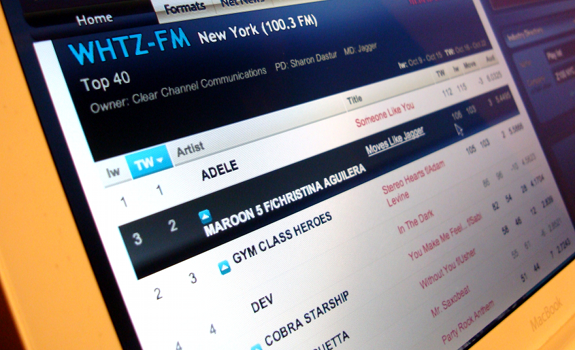How could small market radio stations without big money for fancy auditorium music tests and call-outs, still do music research? (No, it’s not online music testing.)
If you don’t have hundreds of thousands to spend on AMT and call-out research, you could develop your own music study or monitor similar radio stations if you know that these do test songs before giving them serious airplay. It might be a better starting point than online music research websites, for the following reason.
Stay away from online research…
Online music research platforms such as RateTheMusic can reach thousands of people a week. That’s a huge auditorium! There is potential to test many songs efficiently and cheap. You don’t need a location and staff, or pay people 100 bucks for participating. But a major disadvantage of online music testing is that you can’t control the conditions. Respondents may get distracted during the test and you’re never sure who actually sits behind the computer. A 38-year old mother could ask her 10-year old son to do it for her.
 … unless its methodology is transparent
… unless its methodology is transparent
It’s often difficult to judge the validity and reliability of online research. For example: what is the exact sample size and is the population consistent? If it is a national survey, are enough people from your market and target demographic included? What kind of rating scale (1-5, 1-10, etc.) is being used? Can you be sure that extremely high standard deviation scoring respondents are being neglected? These and other questions ask for a clear answer.
Music panels are ‘focus groups’
You could open your own music panel for which visitors of your website can opt-in (most of them will be listeners of your station). Find a way to make sure that every applicant is part of your core target audience. Ask people for their phone number, so you can check if needed. But still you cannot control the way people complete the test. I would therefore treat online music panels like focus groups: they provide idea starters, not scientific results. For example, a session could indicate that listeners like a specific new music style very much or not at all, while you expected the opposite. Then you can use thorough research to verify it.

Cutting Through: Strategies And Tactics For Radio by Ed Shane includes a research chapter (photo: Thomas Giger)
Educate yourself in radio research
If you can’t hire research companies for music testing, don’t have a consultant who knows all about music research, and don’t have knowledge about statistics yourself, I suggest you start with the latter. Make sure to know and understand the basic terminology and methodology of audience research. Take an evening class in statistics, or simply get yourself some good resources. Skip television for a few nights and hit the books. Or ask an experienced researcher for advice.
 Let students facilitate your study
Let students facilitate your study
No time and need a shortcut? You could approach a local university with a media, marketing or communication oriented course. If you defined goals for your research, the faculty can help you develop the study and map results. It’s probably a fun and interesting research case for the class of students. As your air staff probably has the better interview and communication skills, they should execute the actual audience questionnaire.
Interpret music research reports yourself
University professors and students usually don’t know much about radio. Even experienced researchers of top research companies don’t. So be careful when reading any recommendations based on their findings, especially when you do perception studies. Researchers are often rational, logical, left brain oriented. While radio communicates to the emotional, unlogical, right brain of the listener. The most logical decision is not always the best one! Therfore I would say: draw your own conclusions from the findings.
Radio research techniques (side note)
How to exactly conduct music studies for radio is beyond the scope of this article. As it’s very interesting, there will be a separate post about radio research techniques later:
- Auditorium music test (AMT)
- Call out research
- Focus groups
Monitor similar, researched radio stations
What if you want to know which songs are testing well in your market, but can’t afford to hire a research firm and don’t want to ask university faculties? There is another way – obvious, but effective and simple. You can monitor radio stations that have a similar format and target audience as yours, provided that you know for sure that these do spend a lot of budget on high-quality music research. Ideally, they can be heard in the same (or very similar kind of) market, state or country as your own station.
 Analyze their music clock & rotations
Analyze their music clock & rotations
You can aircheck a station live, or record their programming for a few days and then quickly skip through the sound files to make notes. The goal is of course to log the playlist and analyze the station’s music selection, format clock, music categories and rotation patterns. If a current song gets 10 plays in 24 hours, it’s an average rotation of 2.4 hours. On an AC station, that’s an A-song. Chances are high that these power currents are top testers.
Use radio airplay analysis tools
To make your busy radio life easier, you can use websites that monitor radio stations automatically. Some even show complete music sweeps, like a Dutch website, PlaylistBase. You can also find platform-specific websites online, such as the RadioWave Internet broadcast monitor. And I stumbled upon the All Access Mediabase (subscription required). It includes charts for every market, format, and music station in the USA. Inspiration for music directors! They can see, for example, what are the 40 hottest songs on Z100.

The All Access Mediabase website, revealing the current song rotation of New York’s Z100 (photo: Thomas Giger)
Combine your intellect and intuition
All of the above is useful – if you want to monitor airplay trends, or spy on your competitors :-). Of course it can never replace scientific research tailored to your station, format, market and audience. Designing your own study, with help of university faculties, could be a first step towards valid, reliable results for a limited budget. When you operate in a major, competitive market, outsourcing research to a specialist might be necessary. That being said, let’s not forget that radio programming is also about gut feeling. Find the perfect balance between science and art.





Add Your Comment